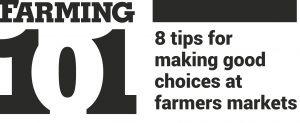1Look around
Before buying anything, take a quick loop around the grounds. Look for overall cleanliness of vendor stands, uncovered food samples, hovering insects and soiled display areas.
2Examine produce
Do not buy bruised or damaged produce because it is prone to bacterial contamination. The exception is “misshapen” produce, which is not damaged but is unusually shaped.
3Ask questions
Speak with the vendor/farmer about how the food was grown; check for license and registrations. “Don’t be afraid to ask questions, and if you’re not comfortable with the answers, politely move on to the next vendor,” said McDonald.
4Raw meat
If you plan to buy raw meats or other perishable items, make sure you have a cooler loaded with ice. Separate raw meats from other foods to avoid cross-contamination.
5Ready-made foods
Pay attention to ready-to-eat foods such as sandwiches, cut fruits and samples. Cold foods should be cold, and hot foods should be hot. Make sure food handlers have a barrier between their hands and the food during handling.
6Unpasteurized milk
While many markets offer unpasteurized dairy products — such as raw milk and cheeses — and unpasteurized juices, McDonald advises against consuming these products.
7Store food
After bringing your purchases home, store foods either in the refrigerator or on the counter, depending on the item. Some fruits and vegetables, such as nectarines, peaches and tomatoes, can be stored on the counter until ripe and then refrigerated. Refrigerate eggs, dairy products and meats, posthaste.
8Before you eat
Make sure to wash produce right before using it, and cook foods to the proper internal temperature, especially meats. Egg dishes and ground meats must be cooked to 160 degrees Fahrenheit; poultry and fowl to 165 F; and steaks, chops and roasts to 145 F.
For more information for consumers on proper food handling and storage and safe cooking temperatures is available at extension.psu.edu/food-safety-
(Farm and Dairy is featuring a series of “101” columns throughout the year to help young and beginning farmers master farm living. From finances to management to machinery repair and animal care, farmers do it all.)
More Farming 101 columns:
- 5 price strategies for farmers
- 5 price research resources for farmers
- How to price farm products
- How to keep your livestock cool
- How to create an irrigation schedule
- How to choose the right irrigation system
- Things to consider when burning agricultural waste
- What can you burn on the farm?
- 9 tips for better pasture management
- 7 safety tips for driving farm equipment on the road
- 5 things to know about farmland leases
- No-till planter in-field checklist
- How to prep a no-till planter part 2
- How to prep a no-till planter
- 7 considerations for gardening with high tunnels
- 9 basic considerations for backyard poultry
- 9 ways to grow your farm business
- 10 questions to ask before expanding the farm
- How to select quality replacement heifers
- Stay safe working with electricity on the farm
- How to create a job safety analysis
- Tips for a successful lambing season
- Do you have a vision for your farm?
- Cattle handling for beginners
- Should I buy a new or used tractor?
- How to inspect a used tractor before purchase
- How to buy the right tractor for your farm
- 5 tips for a better farm marketing plan
- How to seek help with retirement planning
- How to set goals for retirement
- A farmer’s guide to saving for retirement
- A farmer’s guide to planning for retirement
- 5 steps to get NRCS assistance
- How can conservation easements help you?
- How to fund conservation plans
- What is a conservation plan?
- How can NRCS help you?
- More airborne hazards on the farm
- 5 airborne hazards to beware of on the farm
- 5 things to know about Wagyu beef
- Pennsylvania utility vehicle laws
- Ohio utility vehicle laws
- Farm chemical safety checklist
- When should a farm become a business entity?
- Harvest prep: Check your yield monitors
- How to tag livestock properly
- 6 tips for decision making on a family farm
- 8 tips to prepare your farm for agritourism
- How to plan for farm emergencies
- 7 keys to success on the farm
- 7 tips for healthy fair animals
- 5 tips to ensure livestock health before the fair
- 6 tips to keep your livestock parasite free
- 6 tips for vaccinating your livestock
- 5 tips to prevent dairy cow foot problems
- 6 common foot problems found in dairy cows
- Recognize, prevent heat stress in dairy cattle
- How to monitor your dairy herd
- How to start your own dairy farm
- 5 tips for sun safety in the field
- Employing youth for the summer
- What to do if a hay fire occurs
- How to prevent hay fires
- How to extend the life of your fence
- 10 safety tips for installing electric fences
- How to chose the right fence for your farm
- How to create a fencing plan
- 7 steps for easy sprayer calibration
- Prepare for planting season, Part 2: Calibration
- Prepare for planting season, Part 1: The Basics
- 7 tips to improve security on your farm
- 5 tips to protect your farmland
- 3 measures to deal with severe farm debt
- How to buy time to catch up on farm debt
- 6 tips to manage income on the farm
- 5 tips to recognize and deal with farm stress
- How to prepare a livestock birthing kit
- 5 tips for marketing your farm
- How to develop farm mission, vision statements
- 5 tips for setting farm goals
- 2 types of livestock insurance policies
- 6 things you need to know about WFRP plans
- 3 basics of crop insurance
- How does liability insurance work on the farm?
- Why do I need farm insurance?
- How to understand and use Ohio’s CAUV
- How to utilize the Pa. Clean and Green Act
- 9 tips for filing farm taxes
- 8 reasons record keeping for taxes is essential
- 5 tips for post-harvest storage
- 7 tips for family meetings on the farm
- 4 tips for balancing your farm and family
- 4 tips for communicating on the family farm
- 4 tips for firing an employee
- 6 tips for keeping good farm help
- 4 tips for recruiting farm labor
- 5 general farm labor laws
- 4 tips for employing minors
- 4 tips for PTO safety
- 5 things young farmers should know about finances
- The farm balance sheet
- 5 items for your farm’s cash flow statement
- Personal and business records: Keep them separate
- What to include in your farm business plan
- How to approach a lender: Tips for getting a farm loan
- How to use microloans to get your farm started
- Saving for the future: 6 tips for young farmers
- How to create a farm safety kit
- 5 tips for child safety on the farm
- 4 tips for transporting livestock
- 5 ways to better understand tractor stability
- 6 farm equipment hacks















